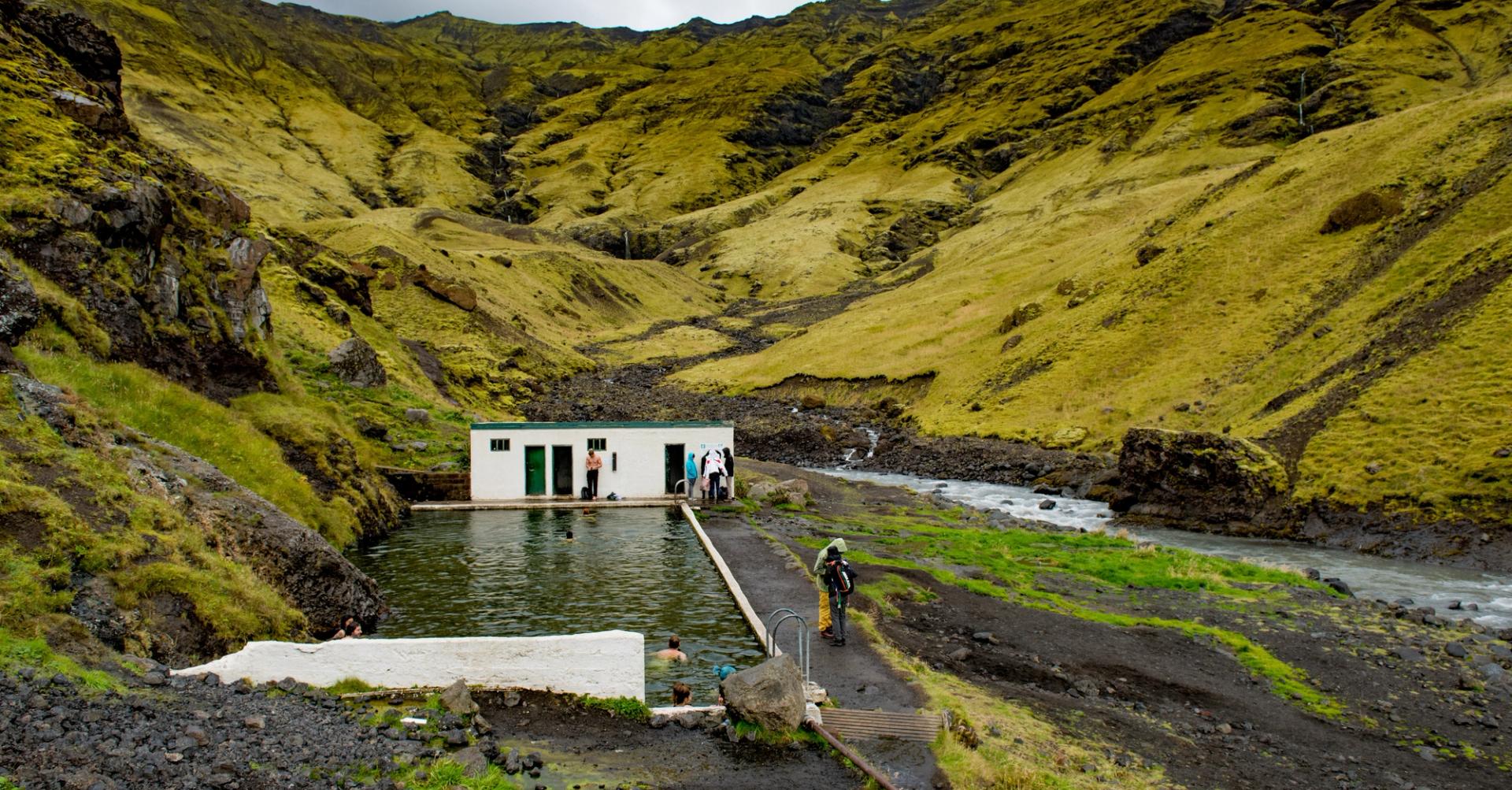 Hot Springs
Hot SpringsGuide to Seljavallalaug Hot Spring in Iceland
Seljavallalaug is by far the best hot spring in Iceland. In this guide, we are going to break down how Seljavallalaug came to be, how you can access it, and what to do when you get there.
It is time to visit one of Iceland’s hidden hot springs, the Seljavallalaug Hot Spring Pool. It is located in a remote location in the Highlands of the South Coast of Iceland.
It can also only be accessed by a short hike through a majestic landscape. This sought-after destination is one of the oldest swimming pools in Iceland. Everything about Seljavallalaug Hot Spring is magical and special, from its history to its location.
So we are going to break down how the pool came to be, how you can access it, and what to do when you get there. Keep reading to learn all about Seljavallalaug Hot Spring, one of Iceland's best geothermal secrets.
The History
So how did Seljavallalaug Hot Spring emerge as one of the oldest swimming pools in Iceland?
Let’s time travel to the 1900s to explain it. The pool was built in 1923 by Björn Andrésson and others. They built it so the locals of Seljavellir could learn how to swim.
Swimming was not a common activity during this time in Iceland, despite the island being surrounded by water. The Icelandic people were not going to let that stop them from learning how to swim.
In 1927, swimming lessons became a part of education and schools in Seljavellir. The swim instructors helped teach everyone in town how to swim. Later it became a “secret spot” that only locals and friends of locals knew about.
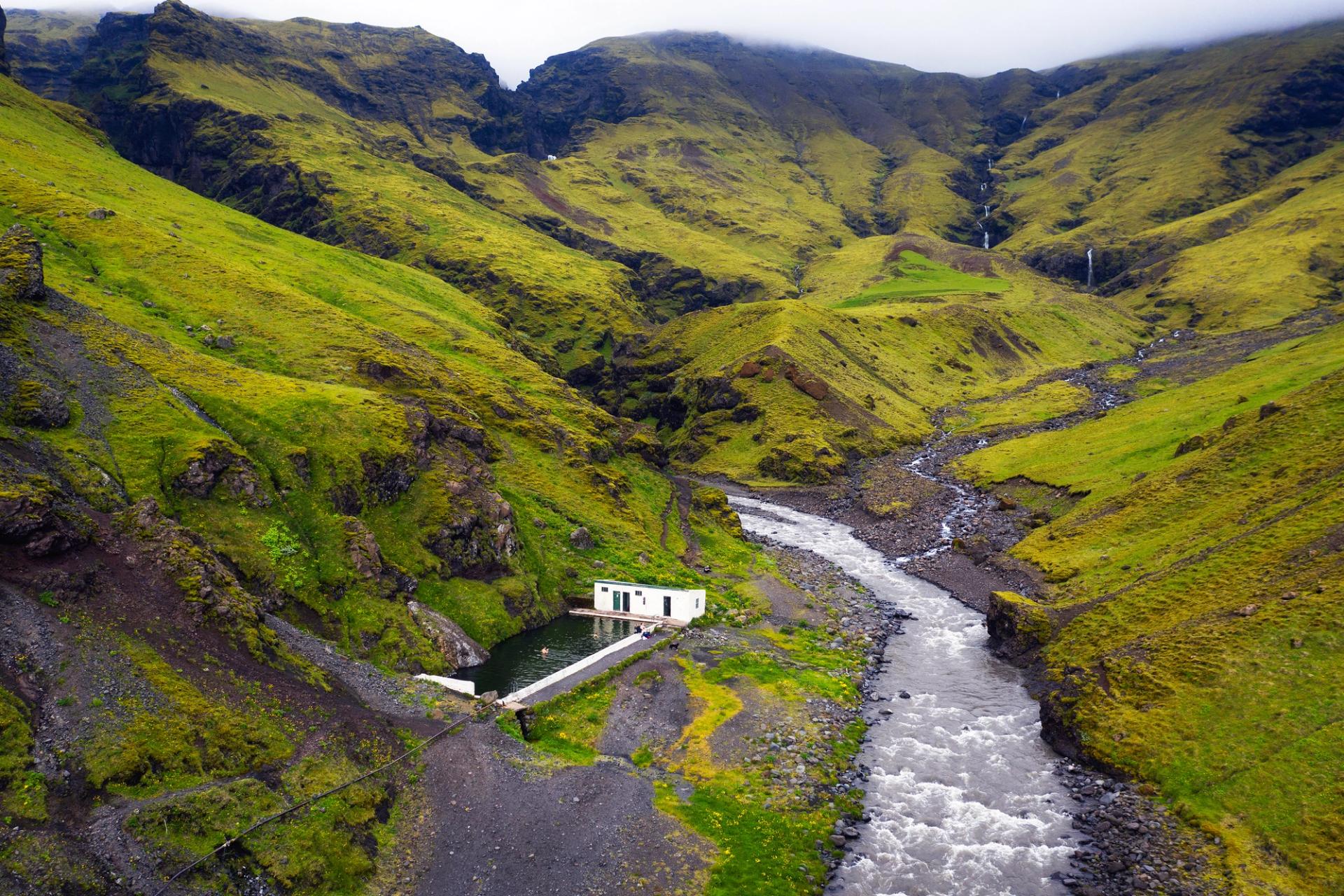
Then in 2010 everything changed, when the Eyjafjallajökull volcano erupted. Eyjafjallajökull is located in the eastern volcanic zone of Iceland, about 4.5 miles north of Seljavallalaug Hot Spring.
The volcano has a unique location, beneath the Eyjafjalla Glacier. With its highest point at almost 5,500 feet above sea level. The eruption in 2010 lasted from January until May. It first started with small earthquakes here and there. Then when early March hit, the earthquake strength increased. On March 21st lava began to flow through a crack that was 0.3 miles long on Fimmvörduháls Pass.
The real issue began on April 14th, when the lava heated the bottom of the crater. This caused the glaciers to melt, creating a mess of mud, ice, and meltwater. The water flowed into the rivers which caused disastrous flooding and damage to the area.
Even worse, the eruption caused phreatomagmatic explosions, a consequence of when water and magma colliding. As a result, ash filled the sky for a length of seven miles. The ash was so bad that it even spread over the North Atlantic Ocean.
This caused disruptions for transatlantic and European flights trying to cross over the ocean near Iceland. National airspaces ended up grounding flights for a few days. Since the ash-filled seven miles of the surrounding area, the Seljavallalaug Hot Spring was one of the places affected. The pool was closed due to it being filled with ash for a long time.
Luckily, with a lot of patience and volunteers, the ash was removed with heavy equipment and dedication. The pool then re-opened the following year in 2011.
This was not the first time that the Eyjafjallajökull volcano erupted either. Scientists showed that it did happen in 920, 1613, and somewhere between 1821-1823. The locals of Seljavallalaug loved their pool and the hard work of the locals reviving it is truly amazing. This is just one of the reasons why Seljavallalaug Hot Spring is so special to both tourists and locals!
How To Get There
So where is the infamous Seljavallalaug Hot Spring? Generally speaking, the area is located near Seljavellir and the Ring Road, in the valley below the Eyjafjallajökull volcano.
The pool itself is located about six miles east of Ásólfsskáli. Seljavallalaug. First, you need to get to the parking area. To do this, you will take road 242 which is marked as Raufarfell, which is located off of The Ring Road.
Then you will pass Þorvaldseyri. After that, you keep driving until you see a sign for Seljavellir. Once you are on that road you continue until you reach the parking area.
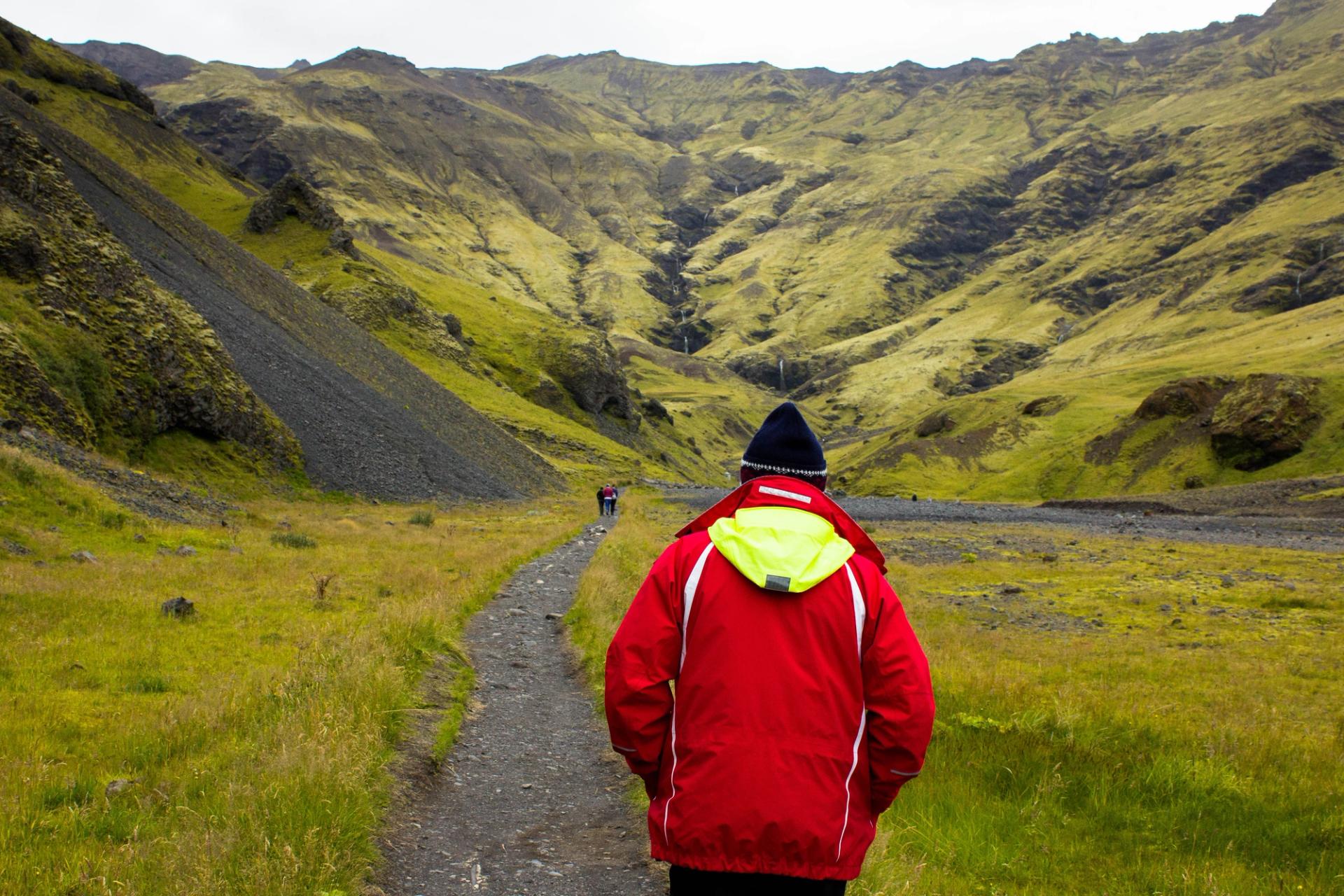
Once you park your car you will notice there is no thermal pool in sight. That is because you need to hike to it! Doesn’t that make it even more intriguing? There are also no signs for the trail. It is an “If you know, then you know” kind of trail.
The hike is a total of 1.2 miles long, taking an average of fifteen minutes each way. You will start your hike by heading towards the bottom of the valley. Keep going until you cross over a small flowing stream. Once you do that, you will see the pool sitting in the distance on the side of the mountain. Head over and enjoy your hike and swim.
Hot Spring or Pool?
There is a common argument as to whether Seljavallalaug is a hot spring or a swimming pool. The facts state that it is a large pool that is 30 feet wide and 82 feet long. It was the largest pool in Iceland until 1932.
It is a shallow pool, four feet in the shallow end and six feet in the deep end. It is also technically a hot spring due to its natural geothermal waters. We would consider Seljavallalaug a hot spring pool because it is truly the best of both worlds.

Now, let’s talk about the views you are going to get here. The pool is surrounded by large vibrant green mountains. In the winter snow blankets the mountains, providing a winter serenity. You will see in some photographs that the pool can appear very clear, while others show it murky and green. That is because of the natural algae that sit within the pool. But don't worry because it is completely safe to swim in. Do remember, this is an independent pool that does not have maintenance.
Luckily, the hot spring naturally cleans itself. The water goes from one side to the other and then filters through the other side. Which is constantly cleaning it. Some volunteers give the pool a good cleaning every now and then. This does only happen once a year, so don’t expect someone to prepare for your visit. If you are sensitive to bacteria, it may be best for you to sit this one out. Otherwise, grab your bathing suit and hiking boots and get ready to enjoy the spring.

How Hot Does It Get?
When you think of a hot spring you most likely think of boiling hot water. While this is the case at most hot springs, it is not at Seljavallalaug Hot Spring. The water is more mid-warm than hot, but it is still quite relaxing.
The average water temperature sits between 66°-85°F. This will depend on what time of year you are visiting. The summer will cause the pool to heat up to a warmer temp, while the winter cold will bring the temperature down. In the summer don’t expect to spend your whole day swimming as it can get too hot.
It is recommended to float around or soak for a bit. In the winter, prepare for a quick in-and-out swim session, as the water temperature can become too cold to hang out in. Honestly, the view alone is worth the visit any time of the year.

Where To Stay
Turn your day trip into an overnight one. Although camping is not allowed at the springs, there are plenty of places to camp nearby.
Some popular campgrounds are Skógar Campsite and Vik Camping. Skógar Campsite is located right near the famous Skogafoss waterfall. Which is roughly a fifteen-minute drive from the parking area of Seljavallalaug Hot Spring.
Skogafoss waterfall is quite impressive and can be viewed from your campsite. It is one of the biggest waterfalls in Iceland with a drop of some 196 meters. Want to chase more of Iceland’s waterfalls? Be sure to read our Top 10 Most Beautiful Waterfalls list.
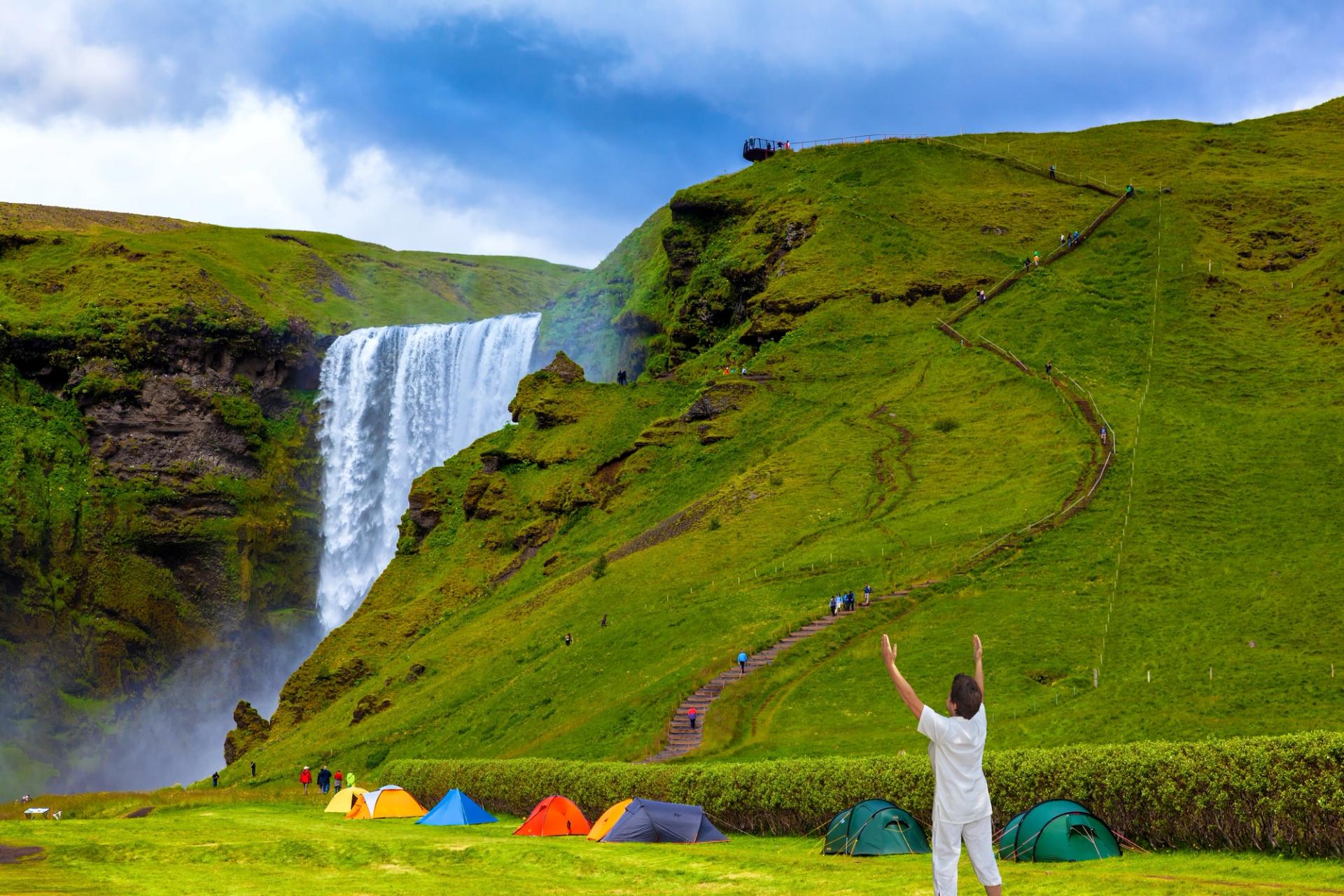
Vik Camping is another option that is close to the pool. They offer electricity, toilets, warm and cold running water, showers, WiFi, and dining facilities. The campground is also near the stunning Black Sand Beach of Vik, a short five-minute drive away. Enjoy some time marveling at the jet black sand and piercing rocks in the sea.
If hotels are more your style, there are many choices nearby. Hotel Skogafoss is a top-rated two-star hotel that can be a convenient stop after the springs. The hotel is also located next to Skogafoss waterfall, which is a short fifteen-minute drive away from the Seljavallalaug Hot Spring parking area.
This bed and breakfast serves up some delicious food that is included in your rate. Their beds are comfortable and cozy, a perfect place to end your day. They have a restaurant on-site, which serves breakfast, lunch, and dinner. Some menu items include smoked salmon, creamy mushroom pasta, and homemade fish cakes. Yum!
The Umi Hotel is a four-star accommodation that is only a five-minute drive from the parking area of Seljavallalaug Hot Spring. It is a more luxurious option that provides majestic mountain views in the Icelandic countryside.
You can also take in the views of the Westman Islands and the Southern Coast Line. Have a nightcap at the hotel bar which has a warm fireplace. You can also see views of Eyjafjallajökull right from the window. The restaurant on the property serves Japanese-inspired Icelandic dishes. Some seasonal menu items being served are Japanese Wagyu, Icelandic Scallops, and Canadian Lobster. When you are done with dinner head to your elegant yet comfortable room.
How To Prepare
Be sure to pack appropriately for your journey. When normally visiting a hot spring in Iceland, a towel and bathing suit would suffice. Seljavallalaug Hot Spring is a bit more complicated, in a good way! Don’t forget about the hike to the pool. Be sure to dress warmly with layers during the winter months.
The trail can become completely snow-packed and icy at times. In the summer it can get very hot, so bring sunscreen and cooler clothes. Every season requires extra water and protein-based snacks. If you are swimming during the summer months, make sure to stay hydrated as the water does get downright hot.
In the winter you can pack a hot tea or coffee in a thermos, to warm you up after you get out of the colder water. Also, don’t forget your hiking boots or workout shoes. As tempting as it is to go to the pool in sandals, it is not realistic. You are hiking to the pool, which means you will be walking on terrain that has dirt and rocks.
A pro tip is to pack some extra socks for after the swim, so you don’t have to put on a dirty muddy pair. If you are visiting in the summer, check out our what to pack for Iceland in our summer list.

Speaking of getting changed. There are changing rooms located next to the pool, but there are no toilets or showers. Most people hike with their swimsuits under their hiking clothes on the way to the spring. Hiking back in wet clothes is not ideal, so utilizing the changing room is a good idea. However, there have been reviews that the changing rooms can get pretty gross. That is unfortunately due to visitors not following the “leave it as you find it” rule.
Do not leave any garbage behind and clean up after yourself. It is so important to keep Iceland beautiful and clean by following this. Since there are no employees at the hot spring, it is up to you to keep it pristine. Also, be respectful of your fellow explorers. You can technically spend as much as you'd like at the pool since there is no timed entry. Take your time and enjoy it, but also share the pool accordingly.
The last way to prepare is to relax and have some fun! You are literally in one of the most beautiful places in the world. Be present and enjoy the scenery of Iceland, all while floating around in a hot spring pool that is packed with history and devotion.

Latest Blog Posts
 Guides
GuidesThe 2022 Eruption of Fagradalsfjall Volcano - An Unforgettable Iceland Volcano Eruption
Iceland has become a top destination for mind-blowing mountain hikes, volcanic hot springs, and icy glaciers. Adventurers flock to the land of fire and ice to experience these thrilling opportunities! So it is no wonder why Iceland's volcanic eruptions attract visitors from all over the world!
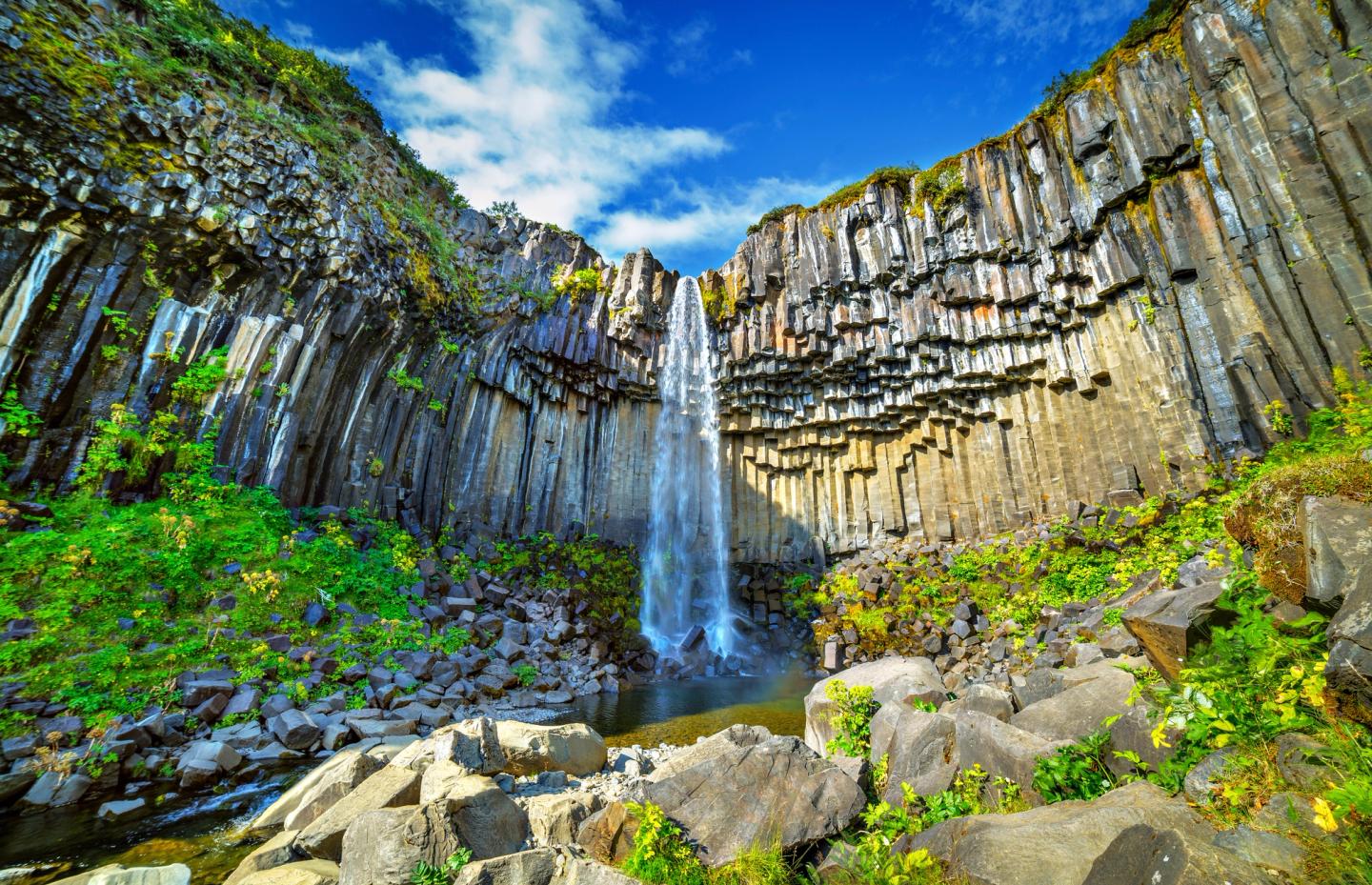 Waterfalls
WaterfallsGuide to Svartifoss Waterfall in Iceland
Svartifoss, or the 'Black Waterfall', is an exquisite natural wonder tucked away in the Vatnajökull National Park of Iceland. Known for its distinctive basalt columns and cascading water, this waterfall is a must-see for nature lovers and travelers.
 Itineraries
ItinerariesTop 11 Must-Visit Volcanic Sites in Iceland
Iceland has over 130 volcanoes located throughout the country, with 30 of them still active today. Some of them are famous for recent volcanic eruptions, while others have not erupted in thousands of years. There are so many notable Iceland volcanoes, it is hard to know which ones you can visit. With the nickname of The Land of Fire and Ice, you know you won’t be disappointed when it comes to Iceland's volcanic sites. Here are our top 11 must-visit volcanic sites in Iceland!